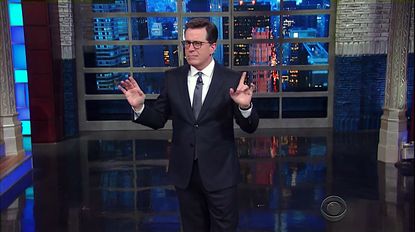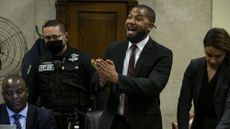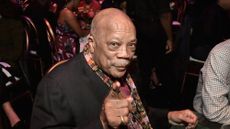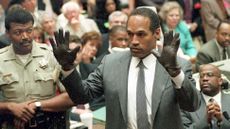Stephen Colbert doxes Republicans for selling out your internet privacy


"Anybody here use the internet?" Stephen Colbert asked his audience at Wednesday's Late Show. "Might want to knock that off, because Congress has now voted to allow internet providers to sell your web-browsing history." The audience booed, and Colbert took the longer view. "This is what's wrong with Washington, D.C.," he said. "I guarantee you, there is not one person, not one voter of any political stripe anywhere in America, who asked for this. No one. No one in America stood up at a town hall said, 'Sir, I demand you let somebody else make money off my shameful desires!'"
"I can't believe they're publicly taking the side of big internet cable companies," Colbert said. "Taking the side of a cable company? The only thing less popular would be if they passed a bill allowing traffic jams to call you during dinner to give you gonorrhea." He played a clip of Rep. Marsha Blackburn (R-Tenn.), who wrote the bill, gamely defending it as good for consumer privacy. "I know what's in her internet history," Colbert said: "'How to spout bullshit.'" Along with being able to sell your browser history, the bill makes it so ISPs also no longer have to protect customer information against hackers and thieves.
"At least Congress did something, that's refreshing," Colbert said. After their health-care dumpster fire last week, Republicans are returning with a "Plan B," and President Trump said Wednesday that passing the mysterious new bill will be super easy this time. "When he says stuff like that, it worries me. Just five days ago, just five days ago, the Republican Party exploded in a mist of blood and bone fragments," Colbert said. "He has the memory of a goldfish — maybe that's why he's the exact same color."
Subscribe to The Week
Escape your echo chamber. Get the facts behind the news, plus analysis from multiple perspectives.

Sign up for The Week's Free Newsletters
From our morning news briefing to a weekly Good News Newsletter, get the best of The Week delivered directly to your inbox.
From our morning news briefing to a weekly Good News Newsletter, get the best of The Week delivered directly to your inbox.
The Late Show also dabbled in a little fictional fair-play, imagining what you would find if you purchased the browsing history of congressional Republicans — then releasing it for all to see. (It's SFW). Watch below. Peter Weber
Sign up for Today's Best Articles in your inbox
A free daily email with the biggest news stories of the day – and the best features from TheWeek.com
Peter has worked as a news and culture writer and editor at The Week since the site's launch in 2008. He covers politics, world affairs, religion and cultural currents. His journalism career began as a copy editor at a financial newswire and has included editorial positions at The New York Times Magazine, Facts on File, and Oregon State University.
-
 Why more and more adults are reaching for soft toys
Why more and more adults are reaching for soft toysUnder The Radar Does the popularity of the Squishmallow show Gen Z are 'scared to grow up'?
By Chas Newkey-Burden, The Week UK Published
-
 Magazine solutions - December 27, 2024 / January 3, 2025
Magazine solutions - December 27, 2024 / January 3, 2025Puzzles and Quizzes Issue - December 27, 2024 / January 3, 2025
By The Week US Published
-
 Magazine printables - December 27, 2024 / January 3, 2025
Magazine printables - December 27, 2024 / January 3, 2025Puzzles and Quizzes Issue - December 27, 2024 / January 3, 2025
By The Week US Published
-
 Honda and Nissan in merger talks
Honda and Nissan in merger talksSpeed Read The companies are currently Japan's second and third-biggest automakers, respectively
By Peter Weber, The Week US Published
-
 Taylor Swift wraps up record-shattering Eras tour
Taylor Swift wraps up record-shattering Eras tourSpeed Read The pop star finally ended her long-running tour in Vancouver, Canada
By Peter Weber, The Week US Published
-
 Drake claims illegal boosting, defamation
Drake claims illegal boosting, defamationSpeed Read The rapper accused Universal Music of boosting Kendrick Lamar's diss track and said UMG allowed him to be falsely accused of pedophilia
By Rafi Schwartz, The Week US Published
-
 'Wicked' and 'Gladiator II' ignite holiday box office
'Wicked' and 'Gladiator II' ignite holiday box officeSpeed Read The combination of the two movies revitalized a struggling box office
By Peter Weber, The Week US Published
-
 Jussie Smollet conviction overturned on appeal
Jussie Smollet conviction overturned on appealSpeed Read The Illinois Supreme Court overturned the actor's conviction on charges of staging a racist and homophobic attack against himself in 2019
By Peter Weber, The Week US Published
-
 Quincy Jones, music icon, is dead at 91
Quincy Jones, music icon, is dead at 91Speed Read The legendary producer is perhaps best known as the architect behind Michael Jackson's 'Thriller'
By Peter Weber, The Week US Published
-
 OJ Simpson, star athlete tried for murder, dead at 76
OJ Simpson, star athlete tried for murder, dead at 76Speed Read The former football hero and murder suspect lost his battle with cancer
By Rafi Schwartz, The Week US Published
-
 Momofuku's 'Chili Crunch' trademark uproar
Momofuku's 'Chili Crunch' trademark uproarSpeed Read The company's attempt to own the sole rights has prompted backlash
By Rafi Schwartz, The Week US Published